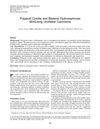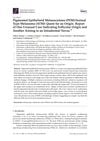 56 citations,
April 2015 in “American journal of medical genetics. Part A”
56 citations,
April 2015 in “American journal of medical genetics. Part A” Patients with Bohring-Opitz syndrome and ASXL1 mutations need regular kidney ultrasounds to check for tumors.
 2 citations,
September 2004 in “Fertility and sterility”
2 citations,
September 2004 in “Fertility and sterility” High androgen levels can cause excessive hair growth and may indicate serious health issues, including heart disease and fertility problems.
 3 citations,
February 2019 in “Journal of endourology case reports”
3 citations,
February 2019 in “Journal of endourology case reports” Polypoid cystitis can mimic bladder cancer but can be effectively treated with surgery, stents, and medication.
 4 citations,
October 2012 in “Expert Review of Dermatology”
4 citations,
October 2012 in “Expert Review of Dermatology” Dermoscopy greatly improves melanoma diagnosis and reduces unneeded surgeries.
 3 citations,
October 2021 in “Clinical, Cosmetic and Investigational Dermatology”
3 citations,
October 2021 in “Clinical, Cosmetic and Investigational Dermatology” Scalp melanoma, a deadly skin cancer, is often found late due to its hard-to-see location, especially in older men. Early detection, possible treatments, and the role of hairdressers in spotting it early are discussed. More research is needed to improve detection and treatment.
February 2023 in “European Journal of Medical Research” Certain existing drugs, like glycopyrronium and botulinum toxin type A, may help treat excessive sweating.
 January 2025 in “PROTEOMICS”
January 2025 in “PROTEOMICS” Drug repositioning is a promising way to quickly develop new treatments, especially for rare diseases.
 1540 citations,
October 2008 in “Fertility and Sterility”
1540 citations,
October 2008 in “Fertility and Sterility” The report concludes that PCOS is mainly a condition of excess male hormones and its definition may change as new information is discovered.
 22 citations,
June 2007 in “Radiologia Medica”
22 citations,
June 2007 in “Radiologia Medica” Testicular microlithiasis may increase the risk of testicular cancer and patients with it should be closely monitored.
11 citations,
January 2016 in “BMC veterinary research” Urinary Se to creatinine ratio, serum Se, and glutathione peroxidase are effective early biomarkers for selenium status in dogs.
 60 citations,
July 2020 in “ACS Nano”
60 citations,
July 2020 in “ACS Nano” Using CRISPR for gene editing in the body is promising but needs better delivery methods to be more efficient and specific.
May 2016 in “Mayo Clinic proceedings” A gluten-free diet fixed a man's severe stomach pain and bowel issue related to celiac disease, but not much his hair loss.
 14 citations,
February 2016 in “Journal of Obstetrics and Gynaecology Research”
14 citations,
February 2016 in “Journal of Obstetrics and Gynaecology Research” Blood tests are needed to confirm high male hormone levels in women with PCOS, as physical signs alone are not reliable.
 5 citations,
June 2022 in “Frontiers in Endocrinology”
5 citations,
June 2022 in “Frontiers in Endocrinology” Research from 2011 to 2020 shows androgen receptors could be key for prognosis and treatment in certain breast cancers.
 3 citations,
January 2012 in “Hanyang Medical Reviews”
3 citations,
January 2012 in “Hanyang Medical Reviews” The document concludes that more research is needed to create suitable diagnostic criteria and understand PCOS in Korean women, and genetics may allow for personalized treatment.
 48 citations,
February 2008 in “Nutrition in Clinical Practice”
48 citations,
February 2008 in “Nutrition in Clinical Practice” Dietary changes, including weight loss and a balanced diet, are important for managing PCOS, especially in overweight women.
 March 2024 in “BMC cancer”
March 2024 in “BMC cancer” High levels of ST14 and TMEFF1 proteins in ovarian cancer are linked to worse patient outcomes and may be a new treatment target.
 13 citations,
February 2016 in “Clinical Medicine”
13 citations,
February 2016 in “Clinical Medicine” The document concludes that diagnosing and treating hair loss is complex and requires understanding its psychological effects and underlying causes, while also calling for more research and new treatments.
 947 citations,
February 2004 in “The Journal of Clinical Endocrinology and Metabolism”
947 citations,
February 2004 in “The Journal of Clinical Endocrinology and Metabolism” Most women with excess male hormones have Polycystic Ovary Syndrome, and hormonal therapy can improve symptoms but may cause side effects.
 5 citations,
August 2003 in “British Journal of Dermatology”
5 citations,
August 2003 in “British Journal of Dermatology” Iron deficiency might contribute to hair loss in women.
 22 citations,
August 2011 in “Endocrine Practice”
22 citations,
August 2011 in “Endocrine Practice” Most hirsutism cases are due to PCOS, and treatment focuses on lowering testosterone and blocking its effects.
 7 citations,
January 1992 in “Adolescent and pediatric gynecology”
7 citations,
January 1992 in “Adolescent and pediatric gynecology” Early diagnosis and treatment of PCOS in teenagers can help prevent more severe adult PCOS.
 9 citations,
October 2012 in “Frontiers of Hormone Research”
9 citations,
October 2012 in “Frontiers of Hormone Research” Antiandrogens are the main treatment for hirsutism, with individualized care and safe, affordable options needed.
 May 2002 in “Australasian Journal of Dermatology”
May 2002 in “Australasian Journal of Dermatology” Finasteride is effective for male hair loss, teledermatology is accurate and accepted, and cyclosporin helps treat toxic epidermal necrolysis.
 155 citations,
August 1991 in “Journal of The American Academy of Dermatology”
155 citations,
August 1991 in “Journal of The American Academy of Dermatology” Methotrexate treats various disorders by inhibiting DNA synthesis, but careful monitoring is needed to avoid toxicity and manage side effects.
 96 citations,
September 2008 in “Seminars in Cutaneous Medicine and Surgery”
96 citations,
September 2008 in “Seminars in Cutaneous Medicine and Surgery” Hormonal treatments, including birth control and antiandrogens, can effectively treat acne in women.
 4 citations,
August 2017 in “International journal of molecular sciences”
4 citations,
August 2017 in “International journal of molecular sciences” The conclusion is that Pigmented Epithelioid Melanocytoma can start from hair follicle stem cells or from a mole on the skin.
 19 citations,
September 2004 in “Reviews in gynaecological practice”
19 citations,
September 2004 in “Reviews in gynaecological practice” Effective hirsutism management requires identifying the cause, combining new and traditional treatments, and setting realistic expectations for patients.
 169 citations,
August 2004 in “Baillière's best practice & research. Clinical obstetrics & gynaecology/Baillière's best practice and research in clinical obstetrics and gynaecology”
169 citations,
August 2004 in “Baillière's best practice & research. Clinical obstetrics & gynaecology/Baillière's best practice and research in clinical obstetrics and gynaecology” Lower doses of treatments for hirsutism and acne in PCOS are effective and cause fewer side effects.
 59 citations,
February 2021 in “BMJ”
59 citations,
February 2021 in “BMJ” High doses of cyproterone acetate increase the risk of brain tumors in women, but the risk decreases after stopping the medication.


























